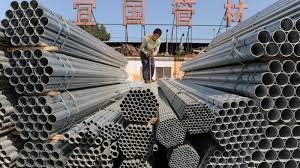Globaltraded.com — The world of commodity trading is a vast, complex, and highly influential sector, dominated by a few key players whose operations span the globe. These companies, often referred to as the “kings” of commodity trading, have shaped the global economy by ensuring the flow of essential resources such as grains, oil, metals, and more. Among the most prominent are Archer Daniels Midland (ADM), Cargill, Trafigura, Glencore, Vitol, Mercuria, Louis Dreyfus Company (LDC), Bunge, Gunvor, and Noble Group. Each of these companies has a rich history, rooted in the vision and perseverance of their founders, and continues to play a crucial role in international trade today.
Archer Daniels Midland (ADM): The Agricultural Powerhouse
Founded in 1902, Archer Daniels Midland (ADM) began as a small linseed crushing business in Minneapolis. Over the next century, ADM expanded its operations globally, transforming into one of the largest agricultural processors and food ingredient providers in the world. The company’s core commodities include corn, soybeans, wheat, and cocoa, and its product offerings range from animal feed to biofuels.
ADM’s international trade journey began in the early 20th century as it started exporting grain and oilseeds. The company’s commitment to innovation and sustainability has been a driving force behind its expansion. Today, ADM operates in over 170 countries and employs more than 38,000 people. The company’s revenue exceeded $100 billion in 2023, reflecting its significant influence in the global food supply chain.
Cargill: The Private Giant
Cargill, founded in 1865 by William Wallace Cargill, started as a small grain storage business in Conover, Iowa. Over time, the company diversified into trading, processing, and distributing agricultural commodities. By the early 20th century, Cargill had established itself as a key player in international markets, particularly in Europe and Latin America.
Cargill’s business model focuses on trading commodities such as grains, oilseeds, meat, and bio-industrial products. Its global reach is immense, with operations in 70 countries and a workforce of approximately 155,000 employees. Despite being a privately held company, Cargill’s revenue was reported to be around $165 billion in 2023, making it one of the largest companies in the world.
Trafigura: The Metals and Energy Specialist
Trafigura was founded in 1993 by Claude Dauphin and Eric de Turckheim, former employees of Marc Rich + Co, a pioneer in modern commodity trading. Initially focused on oil trading, Trafigura quickly expanded into metals, particularly copper, zinc, and lead. The company’s strategy of operating in high-risk, high-reward markets allowed it to grow rapidly.
Trafigura’s business is split between energy and metals, with the latter accounting for a significant portion of its revenue. The company has a strong presence in emerging markets, and its global network includes over 100 offices in 48 countries. Trafigura employs around 9,000 people and reported revenues of $318 billion in 2023, underscoring its position as a leader in the commodity trading industry.
Glencore: The Global Juggernaut
Glencore, originally founded as Marc Rich + Co in 1974, was rebranded in 1994 after a management buyout. The company’s early focus was on oil and metals trading, and it quickly gained a reputation for aggressive deal-making and operating in politically unstable regions. Over the years, Glencore expanded into mining, further solidifying its status as a commodities powerhouse.
Today, Glencore is one of the world’s largest diversified natural resource companies, with interests in metals, energy, and agriculture. The company operates in over 50 countries and employs more than 135,000 people. Glencore’s 2023 revenue was approximately $255 billion, driven by its extensive mining operations and trading activities.
Vitol: The Oil Trading Behemoth
Vitol, founded in 1966 by Henk Viëtor and Jacques Detiger in Rotterdam, started as a small oil trading company. Over the decades, Vitol has grown into the largest independent energy trader in the world. The company’s core business revolves around crude oil, refined products, natural gas, and LNG.
Vitol’s success is built on its deep understanding of global energy markets and its ability to manage risk effectively. The company operates in over 40 countries and employs around 7,000 people. In 2023, Vitol’s revenue exceeded $500 billion, reflecting its dominance in the global energy market.
Mercuria: The Energy and Commodity Innovator
Mercuria was founded in 2004 by Marco Dunand and Daniel Jaeggi, both former executives at Phibro, a leading commodity trading firm. Mercuria quickly established itself as a major player in the energy markets, particularly in oil and gas. The company has since diversified into power, metals, and agricultural products.
Mercuria’s innovative approach to trading and its investment in infrastructure have been key to its growth. The company operates in more than 50 countries and employs over 2,000 people. Mercuria’s 2023 revenue was approximately $150 billion, driven by its strong performance in energy trading and its growing presence in renewables.
Louis Dreyfus Company (LDC): The Agricultural Giant
Founded in 1851 by Léopold Louis-Dreyfus, the Louis Dreyfus Company (LDC) began as a grain trading business in France. Over the years, the company expanded its operations to include a wide range of agricultural commodities, including cotton, coffee, sugar, and oilseeds.
LDC’s global expansion began in the late 19th century, as it established trading offices in key markets such as the United States and Brazil. Today, LDC operates in more than 100 countries and employs around 18,000 people. The company’s revenue in 2023 was estimated to be around $55 billion, making it one of the largest agricultural traders in the world.
Bunge: The Agribusiness Leader
Bunge was founded in 1818 in Amsterdam by Johann Peter Gotlieb Bunge. Initially a small trading company, Bunge relocated to Argentina in 1884 and focused on trading grain and oilseeds. The company’s international expansion began in the early 20th century as it entered the US market and established itself as a major player in the global agribusiness sector.
Bunge’s core commodities include soybeans, corn, wheat, and sugar. The company operates in more than 40 countries and employs around 23,000 people. Bunge’s 2023 revenue was approximately $67 billion, driven by its strong presence in the global food and feed markets.
Gunvor: The Resilient Energy Trader
Gunvor was founded in 2000 by Gennady Timchenko and Torbjörn Törnqvist as a small trading company focused on exporting Russian oil. The company quickly expanded its operations to include trading in other energy products, such as natural gas and coal. Despite facing significant challenges, including sanctions on its co-founder Timchenko, Gunvor has remained resilient and continues to be a major player in the energy markets.
Gunvor’s business is centered around energy trading, with a particular focus on crude oil and refined products. The company operates in more than 20 countries and employs around 1,600 people. Gunvor’s 2023 revenue was estimated to be around $135 billion, reflecting its continued strength in the energy sector.
Noble Group: The Commodities Survivor
Noble Group was founded in 1986 by Richard Elman as a small trading company in Hong Kong, focused on exporting scrap metal from Asia to the US. Over the years, Noble expanded into other commodities, including coal, iron ore, and agricultural products. The company’s rapid growth made it one of the largest commodity traders in the world.
However, Noble faced significant financial difficulties in the 2010s, leading to a major restructuring and the sale of key assets. Despite these challenges, Noble has managed to survive and continues to operate in the commodity trading sector. The company’s current focus is on energy and metals trading, with operations in over 10 countries and a workforce of approximately 400 employees. ( globaltraded.com )
Read More:




























































